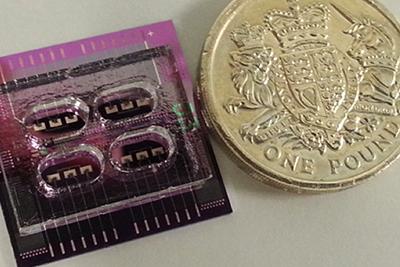Industry support for exciting new AMR diagnostics research by Southampton team

There is an urgent need to develop easy-to-use, sensitive tests that can detect drug resistance at the bedside so that appropriate, potentially life-saving antibiotics can be prescribed without delay.
A University of Southampton team led by NAMRIP member, Professor Hywel Morgan, has developed a cost-effective, highly sensitive and portable digital microfluidic device that exploits Recombinase Polymerase Amplification(RPA) and on-chip fluorescence to quantitatively detect antimicrobial resistance genes in DNA extracted from patient samples. The devices can control tiny reaction droplets on its surface using electric fields and carry out an automatable diagnosis process. The team hopes that the platform could form the basis of an easy-to-use, disposable device that hospitals or community doctors could use to identify multiple antibiotic resistance genes in patients with serious infections, so that the optimum treatment can be started as soon as possible. The researchers have published their work, which is funded by the National Institute for Health Research (NIHR), Rapid detection of infectious agents at point of triage (PoT), II-ES-0511-21002. Details of the journal papers are below.
The team has also developed a device that combines semiconductor TFT nanoribbon sensor and RPA biochemistry to offer ultra-fast diagnosis based on pH electrical readout system. They claim that this approach provides even faster, more sensitive detection than conventional fluorescence using exo-probes for quantifying the amplified target DNA. In tests the technology was capable of achieving some results in under three minutes.
TwistDx Ltd found the Southampton team's research exciting and, after interviewing them, selected them as one of their innovators and made an innovator video of them for the TwistDx website. The company manufactures and sells isothermal DNA amplification reaction kits and was formed in 2002, with its operational facilities in Cambridge, UK. TwistDx Inc. is the parent company, which was founded in 1999. Its headquarters are in Cambridge, Massachusetts. The company's vision is to expand the uptake of RPA-based molecular testing and technology in all applicable areas freeing scientists and technology developers from the constraints imposed by high temperature DNA amplification techniques.
The Southampton researchers are: Professor Hywel Morgan, Dr Sumit Kalsi, Dr Chunxiao Hu, Dr Ioannis Zeimpekis and Dr Martha Valiadi. Their partners in the research are Public Health England and Sharp laboratories of Europe.
Acknowledgements
This work has been supported by National Institute for Health Research (NIHR), Rapid detection of infectious agents at point of triage (PoT), II-ES-0511-21002. The views expressed in this publication are those of the author(s) and not necessarily those of the NHS, the National Institute for Health Research or the Department of Health.
Feasibly a single chip could be used to both identify the organism that is causing an infection, and to determine whether that organism is resistant to certain antibiotics
Notes for editors
Links to articles:-
‘A programmable digital microfluidic assay for simultaneous detection of multiple anti-microbial genes’ Micromachines, 2017
‘Ultra-fast electronic detection of antimicrobial resistance genes using isothermal amplification and thin film transistor sensors’ Biosensors and Bioelectronics 2017
‘Rapid and sensitive detection of antibiotic resistance on a programmable digital microfluidic platform’ Lab On A Chip 2015
The National Institute for Health Research (NIHR): improving the health and wealth of the nation through research.
Established by the Department of Health, the NIHR:
· funds high quality research to improve health
· trains and supports health researchers
· provides world-class research facilities
· works with the life sciences industry and charities to benefit all
· involves patients and the public at every step
For further information, visit the NIHR website www.nihr.ac.uk